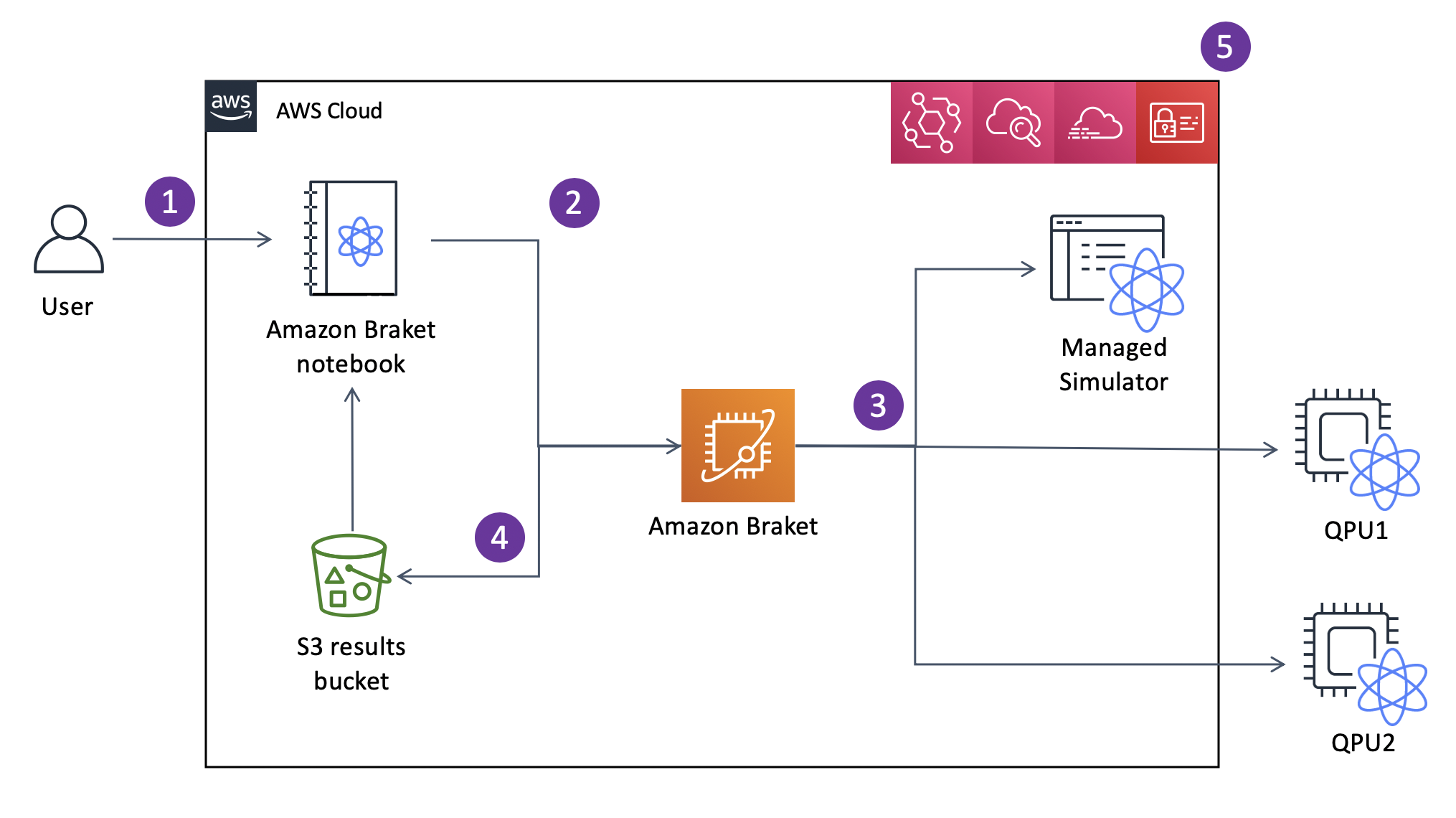The approaches to solutions in quantum computing technology are auspicious. Quantumcomputers are already promising an improved architecture to solve problems that conventional computers can no longer handle. The voices asking how this new technology can be made commercially viable are getting louder. The US cloud computing provider Amazon Web Services has launched “Amazon Braket”, a fully managed quantum computing service that harnesses the potential of quantum computing. Constantin Gonzalez is Principal Solutions Architect at Amazon Web Services and speaks about AWS’s ambitious goals to make quantum computing a breakthrough.
Almost exactly a year ago, Amazon Web Services presented its new “Braket” cloud service in Las Vegas. What is a cloud service? What is special about “Braket”?
Cloud computing is the on-demand delivery of IT resources over the Internet with pay-as-you-go pricing. Instead of buying, owning and maintaining physical data centers and servers, you can access technology services, such as computing power, storage, and databases, on an as-needed basis. One of these technology services is the new Amazon Braket service, a fully managed quantum computing service that helps our customers to get started with this new technology to accelerate research and discovery. Looking at the bigger picture, it is still rare today to have access to a single quantum computer and researchers and developers who are interested in experimenting across a range of quantum hardware and technologies need to set up and manage the necessary infrastructure, negotiate access with multiple vendors, and write custom code to interface with different quantum processors. Amazon Braket helps overcome these challenges by letting customers get started quickly, using familiar tools like Jupyter notebooks to access pre-installed developer tools that can be used to design quantum algorithms, visualize results, and collaborate with others. Amazon Braket offers cross-platform developer tools that let customers design their own quantum algorithms or choose from a growing library of pre-built algorithms, providing a consistent experience so that our customers no longer need to learn multiple development environments and can explore the best quantum computing fit for their application.
Which different quantum computing technologies can be used with “Braket”?
Amazon Braket lets customers run their algorithms on a quantum computer of their choice without having to engage multiple providers or committing to a single technology. Currently, these include quantum annealing superconductor computers from D-Wave, gate-based ion trap computers from IonQ, or gate-based superconductor computers from Rigetti. Over time, we plan to add more choices to give customers the opportunity to test a wider variety of technology types and other providers within various categories.
Which simulation tools does “Braket” offer?
Currently, Amazon Braket offers a choice of three gate-based quantum circuit simulators: The Amazon Braket SDK includes a local simulator for quick validation of circuit designs directly in your local environment or a Jupyter notebook. To run larger, more complex circuits Amazon Braket provides two fully managed simulators on high-performance compute infrastructure. Depending on your use case, you can use SV1, a state vector simulator or TN1, a tensor network simulator. Amazon Braket orchestrates Amazon EC2 clusters and GPU resources to run fully managed, high-performance simulation tasks. Amazon Braket runs simulations as fully managed jobs, automatically determining the optimum compute instance type to run simulations and managing those resources on your behalf. Customers don’t have to understand the various AWS instance types or how well they support a simulation job, as Amazon Braket handles this automatically for them.

Amazon is known as a shipping giant and also as the world leader in cloud computing. For example, what hardware does Amazon use for the “Braket” cloud service? What is the cooperation with other specialist companies that Amazon works with?
Amazon Braket currently offers access to gate-based superconductor computers from Rigetti, quantum annealing superconductor computers from D-Wave, and ion trap computers from IonQ. Over time, we plan to add more choices to give customers the opportunity to test a wider variety of technology types and other providers within various categories.
Volkswagen (VW) is now the largest customer of “Braket”. Is it a customer relationship or a scientific partnership?
By using Amazon Braket, Volkswagen wants to gain in-depth understanding of the meaningful use of quantum computing in a corporate environment and it is using Amazon Braket to access quantum computers of different service providers via a standardized programming interface, helping Volkswagen accelerate development work and improving its quantum algorithms. Volkswagen also uses a multitude of other AWS services for different use cases including a joint development effort with AWS to build the Volkswagen Industrial Cloud, ridesharing services for MOIA, and RIO’s digital logistics and telematics products. AWS customers can also take advantage of Amazon Quantum Solutions Lab engagements, which are collaborative research programs that allow them to work with leading experts in quantum computing, machine learning, and high-performance computing. The programs help customers research and identify the most promising applications of quantum computing for their business and get quantum ready.
Quantum computers will remain very expensive, at least for the foreseeable future, and only a few large corporations can finance them. Amazon’s solution of using other quantum computers and integrating them into their own cloud could be an effective means of commercializing the quantum computer on a broad basis. Is that how you see it and is there an indirect business model with cloud quantum computing behind it?
Quantum computing is still an early-stage technology and building this expertise will take time, but it has the potential to solve computational problems that are beyond the reach of classical computers. It promises to transform areas such as energy storage, chemical engineering, material science, drug discovery, process optimization, and machine learning.
We are hearing from some customers that they are interested in looking into how quantum computing might help their business in the future, but a lot of them face a significant learning curve to become truly quantum ready, as it is hard for customers to engage with quantum computers, particularly if they want to evaluate different early-stage technologies, each with their own development, simulation, and test environments. Without the opportunity to develop the necessary skills, it’s difficult for customers to identify when quantum computing will provide benefit, and learn how they can design algorithms and discover new applications. We think that now is a good time to provide a service that will help customers to start planning around these technologies, and to help overcome these challenges, AWS is not only launching the Amazon Braket service but also the Amazon Quantum Solutions Lab, so that customers can begin learning and experimenting with quantum computing today.

Amazon also offers the use of so-called “hybrid algorithms”. What are hybrid algorithms and what application possibilities are associated with them?
Hybrid quantum algorithms use an iterative approach, with quantum computers as co-processors to classical computing resources. This approach helps mitigate the effect of errors inherent in today’s quantum computing hardware. To help you get started with hybrid algorithms, Amazon Braket supports PennyLane, an open source software framework built around the concept of quantum differentiable programming. This concept allows you to train quantum circuits in the same way that you would train a neural network to find solutions to computational problems in quantum chemistry, quantum machine learning, and optimization. Pennylane is performance-optimized for Amazon Braket and provides interfaces to familiar machine-learning tools, including PyTorch and TensorFlow, to make training quantum circuits fast, easy, and intuitive.
A classic case: A medium-sized company in Germany is currently working on the switch to digitization. Regardless of its market specialization, it would like to integrate quantum computing in order to optimize internal processes. The company comes across Amazon’s “Braket”. How does the cooperation with Amazon work? How does the company bind itself to Amazon?
Amazon Braket is a fully managed service that makes it possible for customers to get started quickly, using familiar tools and providing the same, consistent AWS experience they know today, without having to engage multiple vendors or risk being locked into a single technology. But once the customers get started, it is crucial for them to understand that some types of quantum computers are particularly well suited to solving specific sets of problems. Because we know that a lot of our customers are missing the necessary skills to identify the benefits of quantum computing for their business, we established the Amazon Quantum Solutions Lab, which will help our customers to assess the state of the current technologies, identify how it might impact their business, and prepare for the future. As the technology eventually reaches the point of commercial viability, AWS and its partners will collaborate on experiments with customers and guide them to incorporate quantum solutions into their business. Lab programs will combine hands-on educational workshops with brainstorming sessions to help customers “work backwards” from business challenges, and then go step-by-step through the process of using quantum computers effectively. In combination with customer access to Amazon Braket, and by integrating with familiar software tools for optimization, quantum simulation, computational material science, and quantum chemistry, the Amazon Quantum Solutions Lab will help customers to determine where existing high-performance computing can currently meet their needs, begin to develop their own strategy for quantum computing, build internal expertise, and eventually deploy quantum applications. Amazon Partner Network (APN) partners participating in the Amazon Quantum Solutions Lab include: 1Qbit, Rahko, Rigetti, QCWare, QSimulate, Xanadu, and Zapata.
Which other machine-learning processes are already in use at Amazon?
Our experience working with hundreds of thousands of customers combined with our own experience building machinelearning (ML) driven businesses with Amazon, has given us deep knowledge in what it takes to successfully deploy and scale machine-learning initiatives. AWS offers the broadest and deepest set of machine-learning services and supporting cloud infrastructure. We launched more than 250 new capabilities for machine learning and artificial intelligence in the last year. To give you some examples: as customers look to machine learning to reinvent entire areas of their business, we are building AI Services to address common horizontal and industry-specific use cases. These include Amazon Kendra for intelligent search, Amazon Contact Lens for Amazon Connect, for contact center intelligence, and Amazon CodeGuru and DevOps Guru for developer operations. And at re:Invent 2020, we launched five new machine-learning services that help industrial and manufacturing customers embed intelligence in their production processes in order to improve operational efficiency, quality control, security, and workplace safety.
In healthcare, our customers can use our purpose-built solutions for transcription, medical text comprehension, and the Amazon HealthLake service, a new HIPAA-eligible service to store, transform, query, and analyze petabytes of health data in the cloud. For those who are building their own models, we also invested in making machine learning faster and easier to do with Amazon SageMaker. We built Amazon SageMaker from the ground up to provide every developer and data scientist with the ability to build, train, and deploy machine-learning models quickly and at lower cost by providing the tools required for every step of the ML development lifecycle in one integrated, fully managed service.
On your website you announce that two new containerorchestration services will soon be available: Amazon ECS Anywhere, Amazon EKS Anywhere. What is it and what do the two services do?
ECS Anywhere is an extension of Amazon ECS (Elastic Container Service) which was introduced in 2014 and will allow customers to deploy native Amazon ECS tasks in any environment. This includes traditional AWS-managed infrastructure, as well as customer-managed infrastructure. Our customers will continue using the familiar managed ECS control plane that is running in their chosen AWS region. They can then use AWS Systems Manager to install a new version of the open source ECS agent on their infrastructure of choice, enabling them to run ECS container tasks on their own infrastructure. EKS Anywhere is a new deployment option for Amazon Elastic Kubernetes Service (EKS) that enables customers to easily create and operate Kubernetes clusters on-premises, including their own virtual machines and bare metal servers. In addition, it provides an installable software package for automation tooling of cluster lifecycle support and enables customers to automate cluster management, reduce support costs, and eliminate the redundant effort of using multiple open source or 3rd party tools for operating Kubernetes clusters.
How can the direct or indirect use of quantum computing change the shipping processes of a global shipping company like Amazon? Why does Amazon of all people see great potential in this new technology?
Today, Amazon is much more than a shipping company: Our mission is to be Earth’s most customer-centric company. Amazon is guided by four principles: customer obsession rather than competitor focus, passion for invention, commitment to operational excellence, and long-term thinking. Customer reviews, 1-Click shopping, personalized recommendations, Prime, Fulfillment by Amazon, AWS, Kindle Direct Publishing, Kindle, Fire tablets, Fire TV, Amazon Echo, and Alexa are some of the products and services pioneered by Amazon. Quantum computing is still an early-stage technology and building this expertise will take time, but it has the potential to solve computational problems that are beyond the reach of classical computers. It promises to transform areas such as energy storage, chemical engineering, material science, drug discovery, process optimization, and machine learning. Optimization problems are ubiquitous across many industries including telecommunications, supply chain logistics (including shipping), and financial services. Finding the optimal approach from a set of alternatives can overwhelm classical computers as the number of possible combinations drives up complexity. Quantum computing can be used to address a wide range of these problems, for instance in the field of combinatorial optimization by accelerating linear programming algorithms and Monte Carlo methods.









Um einen Kommentar zu hinterlassen müssen sie Autor sein, oder mit Ihrem LinkedIn Account eingeloggt sein.